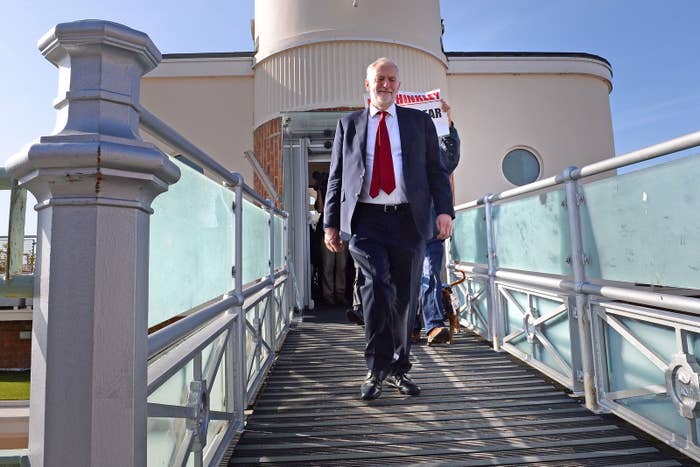
Labour leader Jeremy Corbyn said he "doesn't think" he's ever taken an Uber as he called for "proper regulation" of taxis during an interview with the BBC ahead of the Labour party conference in Brighton on Sunday.
Speaking to The Andrew Marr Show, Corbyn admitted he's "not sure" but "doesn't think" he's ever used the ride-hail service, whose licence Transport for London (TfL) decided not to renew earlier this week.
He was commenting after Marr referred to comments made by the shadow business secretary Rebecca Long-Bailey in July, when she said she believed it was "morally wrong" to use the app.
"What I think we need with Uber is decent pay and conditions for its staff. There is a huge level of exploitation, as the GMB union has pointed out," Corbyn responded.
"What TfL have said is that they have serious concerns about safety, which is why they have proposed the suspension of Uber’s licence, and that, as I understand it, is subject to appeal."
"I'm not sure half a million people would support unfair employment practices or not be concerned about safety"… https://t.co/LBfW85a27c
He added: "Clearly the public want rapid access to taxis of all sorts. It should be regulated, the public should be protected."
Responding to the viral Save Your Uber In London petition, Corbyn denied that the more than 500,000 people who had signed it had "lined up" on the company's side of the debate.
"What they’ve said is they want access to cabs, which is fair enough," Corbyn said. "I'm not sure the same half-million people would support unfair employment practices, or would not be concerned about safety issues, which TfL identified in their examination of it."
"It’s either going to go to court, or they're going to mend their ways and make a new application, and TfL’s going to have to reconsider it. But I do think there’s going to have to be proper regulation of the taxi service and licensing all over the country."
Meanwhile, shadow chancellor John McDonnell echoed Corbyn's Uber comments during an interview on ITV's Peston on Sunday, saying: "Hand on heart, I don't think I've ever used Uber."
He did, however, say there was a chance cars booked for him by producers of TV shows he'd appeared on could have been Uber rides.
Is this the new 'have you ever taken drugs'? Does John McDonnell use Uber? #Peston
Corbyn also addressed the ongoing debate over Labour's stance on single market membership during his Marr interview, saying he "understands" those Labour party members who wanted to remain part of it after Brexit.
In regard to freedom of movement, Corbyn said he "understands the importance of people being able to move between one place and another".
"There is an abuse of freedom of movement by some employers, who have grotesquely exploited some low-paid workers," he said. "That has to stop. But we’re going to need people to work in Europe, we’re going to need people to work here, there’s going to be a lot of movement."
He also said a transitional arrangement with the EU should last "as long as is necessary".
Corbyn said he wants post-Brexit Britain to have "tariff-free" access to the single market but that continued membership would prevent Labour from implementing some of its policies, saying that state aid rules would have prevented Labour from "intervening immediately" over the closure of the Redcar steel works last year.
He also warned against "sweetheart deals" with the US and other nations that "could be damaging" to Britain's working relationship with Europe.
During McDonnell's Peston interview, the shadow chancellor said that "at the moment" it would be "difficult to see" how Britain could maintain membership of the single market given the four freedoms that entails. However, he said Labour was talking to European colleagues about how reforms could take place.
